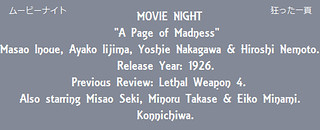
Review #735: A Page of Madness.
Cast
Masao Inoue (Servent), Ayako Iijima (Servent's daughter), Yoshie Nakagawa (Servent's wife), Hiroshi Nemoto (Young man), Misao Seki (Doctor), Minoru Takase (Crazy man A), Eiko Minami (Dancer), Kyosuke Takamatsu (Crazy man B), Tetsu Tsuboi (Crazy man C), and Shintarô Takiguchi (Boy) Directed by Teinosuke Kinugasa.
Review
World cinema films are interesting to review because they can provide a look into the culture and movie techniques of the time, along with being something different as opposed to the regular state of affairs here. And hey, this is also a silent movie from Japan. But let's go one further: This movie has no inter-titles, making it a rare kind of silent film, one in which its all up to the viewer to try to tell what's going on. The movie (also known as Kurutta Ippēji) had a low budget, comprised of silver painted walls and opening credits that were turned page by page (with a hand sticking out in some shots), but the movie's experimental avant-garde style fits perfectly, particularly with the opening scene, with shots of dim lighting and use of shadows. You can try to figure the movie out, or just step back and watch the images put on screen. The movie is interesting to watch because it doesn't quite follow conventions while also displaying a variety of images, ending with masks. The actors certainly emote well in the offbeat world the movie establishes for itself. One notable fact is that the movie's story had four writers, including the director and Yasunari Kawabata, who later won the Nobel Prize for Literature in 1968. This film was lost for 45 years until Kinugasa found it in his storehouse. For the re-release, Aono Jikken Ensemble did the music to accompany it, which I saw in this version. Speaking of which, the music certainly fits with the haunting quality of the movie, not being distracting and fitting with the eccentric quality of a film such as this, which manages to be a one-of-a-kind movie that can be appreciated for all of its quirks. The run time is just barely under an hour, which is a plus for anyone looking to enjoy some cinema from almost 80 years ago that manages to resonate today.
Overall, I give it 9 out of 10 stars.

No comments:
Post a Comment